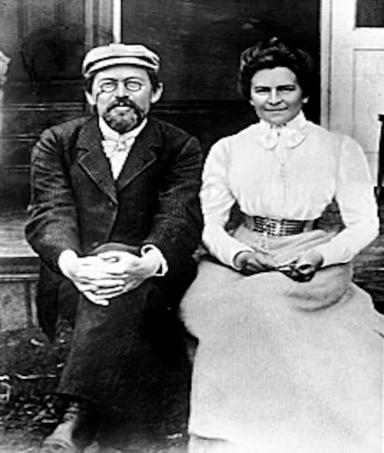Anton & Olga

Anton & Olga is an original television script inspired by the founding of the Moscow Arts Theater (MAT) at the end of the nineteenth century. The complicated creative and romantic relationship between the playwright Anton Pavlovich Chekhov and the theater’s leading actress, Olga Knipper, is at the heart of the narrative, as are the artistic, financial, political, and personal tensions experienced by the rest of the company, including directors Vladimir Nemirovich- Danchenko and Konstantin Stanislavski, whose influence on modern stage and screen acting cannot be overstated.
This group plans to create a television series that begins with the disastrous MAT premiere of Chekhov’s The Seagull—the play that brought Anton and Olga together—and ends with the groundbreaking staging of Chekhov’s final play, The Cherry Orchard, shortly before the writer’s death in 1904. It is a story about marriage and its upheavals and uncertainties. It is about the challenges of artistic collaboration among strong-willed individuals. At its core are the beliefs that art matters, and that artists must be passionately devoted to excellence and originality to create world-changing work.
Co-directors: Jennifer Buckley (English and Theatre Arts) and Dean Bakopoulos (Cinematic Arts)
Chalk: A Dance Theater Exploration of Miscarriage and Motherhood

Chalk is an evening-length dance theater production that examines contemporary motherhood and the hidden wounds of infertility and miscarriage. Created and performed by dancer/choreographer Kristin Marrs and theater artist Anne Marie Nest, Chalk weaves together the narratives of each woman’s challenging journey toward pregnancy at an “advanced maternal age.” Through the narrative, Nest and Marrs explore the personal, professional, relational, financial, and ancestral implications of their experiences with multiple miscarriages, the fertility medical community, and shifting definitions of womanhood and motherhood. Their stories are told with reference to playwright Bertolt Brecht’s Caucasian Chalk Circle, as the artists reflect on their experiences alternately grasping and relinquishing control of their futures, their bodies, their female identities, and contemporary American culture’s ideals surrounding pregnancy, birth, and parenting.
Co-directors: Kristin Marrs (Dance) and Anne Marie Nest (Be Heard & Ask for More: Executive Communications Consulting)
This project is supported by Spelman-Rockefeller funding.
Exploring the Influence of Social Support on Diet-Related Improvements in the Fatigue, Quality of Life, and Mental Health of Individuals with Multiple Sclerosis and the Well-Being of Their Support Partners

Multiple sclerosis is a neurodegenerative disease that significantly impacts individuals' quality of life due to its debilitating symptoms. A growing body of evidence suggests that dietary and lifestyle modifications can serve as valuable non-pharmacological interventions to alleviate symptom burden and enhance overall well-being among people with MS. To further investigate these associations, Wahls Research Team has previously conducted a randomized trial (NCT02914964), comparing the effects of the Modified Paleolithic Elimination and Low Saturated Fat diets on clinical and patient-reported outcomes in individuals with relapse-remitting MS. The results showed that both diets led to clinically significant reductions in perceived fatigue, improved quality of life, and mood enhancement. However, the mediating factors behind these improvements in MS outcomes warrant deeper exploration. Social support has long been recognized as a key predictor of well-being and mental health in individuals with MS. There is a knowledge gap in research focusing on specific aspects of social support and its potential role in mediating reduced fatigue and improved quality of life in people with MS participating in a dietary intervention. Additionally, the influence of social support on the quality of life of caregivers providing support to individuals with MS remains unexplored.
This study seeks to address these gaps by investigating whether social support plays a mediating role in the connection between diet and fatigue, quality of life, and mood among people with MS. Furthermore, it aims to explore the association between the levels of social support and various aspects of health-related quality of life among support persons. The project's objectives also encompass creating evidence-based educational materials to promote social support among people with MS, their support partners, which indirectly affects children’s welfare.
Co-directors: Karin Hoth (Psychiatry), Farnoosh Shemirani (Internal Medicine), and Linda Snetselaar (Epidemiology)